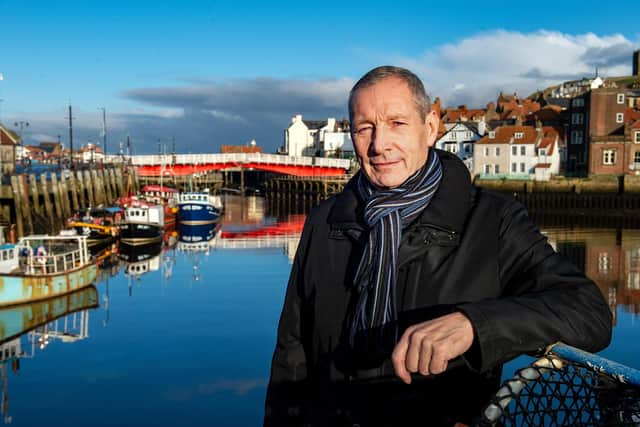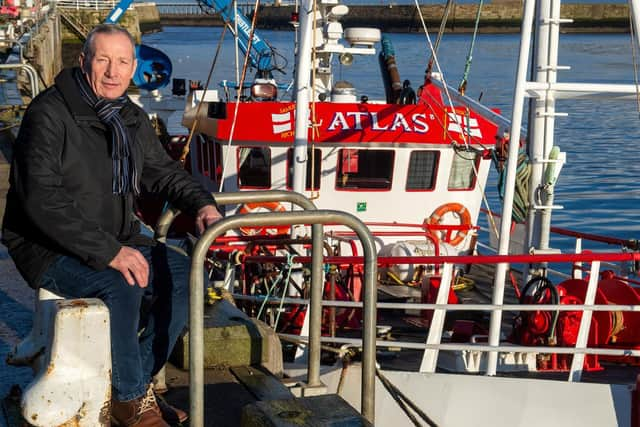Where are our extra fish, ask Yorkshire fishermen after 'disappointing' Brexit deal
The outcome of the Brexit trade deal - announced after months of negotiations on the afternoon of Christmas Eve - has left him and many others bitterly disappointed.
Mr Locker, chairman of Locker Trawlers in Whitby, and former chairman of the National Federation of Fishermen's Organisations, believes Environment Secretary George Eustice should resign.
Advertisement
Hide AdAdvertisement
Hide AdHe says this time the betrayal of fishing communities is worse, because politicians like Mr Eustice, Michael Gove and Prime Minister Boris Johnson "knew exactly what they were doing when they devastated coastal communities."
He said: "This was billed as getting fishing back and the fleet back and our coastal communities back. If I've listened to George Eustice once I must have listened to him 100 times.
"We have even held meetings with Defra on how they were going to share out all the extra fish.
"What extra fish? There isn't any. Certainly not for the port of Whitby or Scarborough. We will be worse off in January than what we were when we started as a full member of the EU.


Advertisement
Hide AdAdvertisement
Hide Ad"If George Eustice thinks that's a good deal, I'd hate to think what he thinks is a bad deal. I think he should resign, that's my personal opinion."
The promise that the UK would take full control of its fishing waters after decades of being bound by the European Union's Common Fisheries Policy - where quotas were set for how many of each type of fish members are allowed to catch - has been a central part of the Brexit debate.
The way the system has developed meant European nations had more rights to fish in UK waters than British fleets had in European waters, in return for frictionless access to sell our catch in the valuable European markets.
But despite its symbolic importance, fishing represents just 0.1 per cent of the British economy, leading to fears the interests of the sector would be sacrificed in favour of more valuable sectors during negotiations with Brussels.


Advertisement
Hide AdAdvertisement
Hide AdThe Brexit deal creates a five and a half year adjustment period, starting from January 2021, in which the value of the catch the UK can take in its own Economic Exclusion Zone will increase incrementally up to an average of 25 per cent.
In monetary terms this will be worth approximately £140 million per year to the UK fishing industry by 2026. At the end of the adjustment period both sides will go back to the negotiating table, though Mr Johnson has claimed "there is no theoretical limit beyond those placed by science or conservation on the quantity of our own fish that we can fish in our waters” after this point.
Negotiations over fishing rights slowed down the Brexit trade talks, with quantities of each species of fish a potential sticking point. And the result is a deal where British quotas of some fish will barely change from the old system.
Mr Locker's boats target "demersal" species - cod, haddock, whiting, saithe (coley) and plaice. When it comes to saithe, after the end of the five and a half year transition period, they will be getting just one per cent extra quota.
Advertisement
Hide AdAdvertisement
Hide AdA major concern for UK fishermen is that they will no longer be able to do "international swaps" with the French, the Germans and Danish for species that they run out of quotas for.
Mr Locker, whose son Andrew is current chairman of the NFFO, and whose other son James is skipper of the Victory Rose, said: "We usually got around 4,000 to 5,000 tonnes a year (of saithe) and we need 15,000 tonnes a year.
"That fish used to come in from Germany and France (in an international swap). That can't happen now."
Lockers Trawlers number only two vessels - they used to have 15 - and they land into Peterhead in Scotland or Denmark.They join a handful of other "white fish" boats operating out of Scarborough and Grimsby.
Advertisement
Hide AdAdvertisement
Hide AdThe large shellfishing fleet out of Bridlington, Scarborough and Hornsea, shouldn't be badly affected as they don't operate on quotas, although there are concerns about disruption to exports post-Brexit, particularly when sending live shellfish.
Mr Locker, who has been fishing for 47 years, said: "Shellfishermen should still have their markets. But for the white fish fleet, the people of Whitby, who were hoping to get back into the white fish sector and have their local markets, it won't happen.
"How do you think my fishermen, my sons feel when they are having to steam past those vessels that are getting a really good living and we can't fish?
"You have to have a big heart to think it will change in 2026 (the end of the transition period)."
Advertisement
Hide AdAdvertisement
Hide AdThe main catch for Yorkshire fishermen is shellfish from tens of thousands of lobster pots, with Bridlington considered the lobster capital of Europe. These lobsters are not subject to quotas like cod and haddock but 85 per of Bridlington's catch is exported to Europe.
Dr Bryce Stewart, a fisheries biologist and Senior Lecturer at University of York , said the most important thing for Yorkshire fishermen was avoiding the disaster of 'no deal, which would have imposed disastrous tariffs and delays. Despite this, the new arrangements will impose some extra costs and paperwork on exporters.
And for local fishermen using smaller boats along the Yorkshire coast, Dr Stewart says Brexit will bring "very little benefit", as the biggest beneficiaries will be firms with much bigger 200ft vessels catching fish like mackerel, where the British quota will rise 29 per cent.
He wrote in a blog post this week: "Many underlying issues remain unsolved, and without a zonal attachment approach to allocating catch shares, the effect of climate change on fish stock distribution will continue to wreak havoc on arrangements. But for now at least, we know the direction in which the ship is sailing."
Advertisement
Hide AdAdvertisement
Hide AdRobert Goodwill, Conservative MP for Scarborough and Whitby and a former government Fisheries Minister, is keen to emphasise the positives from the deal and says the UK will have "complete control over its waters" after 2026.
Attempting to reassure constituents like Arnold Locker, he said: "We are going to get a bigger slice of the quota and in five-and-a-half years time when the transition finishes we are in 100 per cent control and we can decide who we give the quota to."
The biggest concern for fishing firms on the Yorkshire coast was getting a deal, he says. "The majority of the fish we catch in North Yorkshire ports are exported, in most cases live in tanks, to enable them to go to the main markets which are France and Spain.
"They are concerned about possible tariffs, possible restrictions on the number of fish exported and most importantly the bureaucracy and delay that could have resulted in fish dying in their tanks. Nobody in Spain wants a dead lobster."
Advertisement
Hide AdAdvertisement
Hide AdHe also said a new £100m funding package promised by the Government to replace existing European funding could be used to pay for new fishing vessels and equipment as well as training more people to enter the industry.
"We can't get British people to work on the fishing boats in the same way as before," he said. "We need more people to take up the benefits of those additional fish we will be able to catch. British people won't do the work, it is pretty gruelling."
He also told Minister Victoria Prentis on a conference call this week that a marketing effort was needed to make the kinds of fish caught in British waters more attractive to domestic consumers, who are more accustomed to eating battered cod and haddock which is mostly caught further away.
Mr Goodwill said: "It is quite a challenge. A lot of these fish are smaller species that you would eat on the bone. There seems to be a bit of resistance to eating whole fish and one that can look you in the eye."
Advertisement
Hide AdAdvertisement
Hide AdFishing groups have described the Brexit deal as a "betrayal" after promises that hundreds of millions of pounds of fish from British waters would be returning. And Bryce Stewart says there has been a lot of "nonsense" spread about what the UK was due to get back given the complicated history of fishing in Europe.
"I think that 100 million pounds was designed to be a bit of a softener, but fishermen are not stupid, they know the game that's being played here and they know that, ultimately, they haven't been given what they were promised," he said.
"And they should never have been promised as much as they were. But I think because fishing just gained such a high profile, people got a bit carried away."
Comment Guidelines
National World encourages reader discussion on our stories. User feedback, insights and back-and-forth exchanges add a rich layer of context to reporting. Please review our Community Guidelines before commenting.